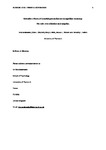Selective effects of errorful generation on recognition memory: The role of motivation and surprise.
| dc.contributor.author | Seabrooke, T | |
| dc.contributor.author | Mitchell, Chris | |
| dc.contributor.author | Wills, Andy | |
| dc.contributor.author | Waters, J | |
| dc.contributor.author | Hollins, Timothy | |
| dc.date.accessioned | 2019-07-18T15:09:56Z | |
| dc.date.issued | 2019-08-01 | |
| dc.identifier.issn | 0965-8211 | |
| dc.identifier.issn | 1464-0686 | |
| dc.identifier.uri | http://hdl.handle.net/10026.1/14653 | |
| dc.description.abstract |
The current research examined the effects of errorful generation on memory, focusing particularly on the roles of motivation and surprise. In two experiments, participants were first presented with photographs of faces and were asked to associate four facts with each photograph. On Generate trials, the participants guessed two of the facts (Guess targets) before those correct facts, and another two correct facts (Study targets), were revealed. On the remaining Read trials, all four facts were presented without a guessing stage. In Experiment 1, participants also ranked their motivation to know the answers before they were revealed, or their surprise on learning the true answers. Guess targets were subsequently better recognised than the concurrently presented, non-guessed Study targets. Guess targets were also better recognised than Read targets, and recognition of Study and Read targets did not differ. Errorful generation also increased self-reported motivation, but not surprise. Experiment 2 showed that the results of Experiment 1 can outlive a 20-minute delay, and that they generalise to a more challenging recognition test. Together, the results suggest that errorful generation improves memory specifically for the guessed fact, and this may be linked to an increase in motivation to learn that fact. | |
| dc.format.extent | 1250-1262 | |
| dc.format.medium | Print-Electronic | |
| dc.language | en | |
| dc.language.iso | en | |
| dc.publisher | Taylor & Francis (Routledge) | |
| dc.subject | Errors | |
| dc.subject | motivation | |
| dc.subject | surprise | |
| dc.subject | memory | |
| dc.subject | education | |
| dc.title | Selective effects of errorful generation on recognition memory: The role of motivation and surprise. | |
| dc.type | journal-article | |
| dc.type | Journal Article | |
| dc.type | Research Support, Non-U.S. Gov't | |
| plymouth.author-url | https://www.webofscience.com/api/gateway?GWVersion=2&SrcApp=PARTNER_APP&SrcAuth=LinksAMR&KeyUT=WOS:000480092400001&DestLinkType=FullRecord&DestApp=ALL_WOS&UsrCustomerID=11bb513d99f797142bcfeffcc58ea008 | |
| plymouth.issue | 9 | |
| plymouth.volume | 27 | |
| plymouth.publication-status | Published | |
| plymouth.journal | Memory | |
| dc.identifier.doi | 10.1080/09658211.2019.1647247 | |
| plymouth.organisational-group | /Plymouth | |
| plymouth.organisational-group | /Plymouth/Admin Group - REF | |
| plymouth.organisational-group | /Plymouth/Admin Group - REF/REF Admin Group - FoH | |
| plymouth.organisational-group | /Plymouth/Faculty of Health | |
| plymouth.organisational-group | /Plymouth/Faculty of Health/School of Psychology | |
| plymouth.organisational-group | /Plymouth/REF 2021 Researchers by UoA | |
| plymouth.organisational-group | /Plymouth/REF 2021 Researchers by UoA/UoA04 Psychology, Psychiatry and Neuroscience | |
| plymouth.organisational-group | /Plymouth/REF 2021 Researchers by UoA/UoA04 Psychology, Psychiatry and Neuroscience/UoA04 REF peer reviewers | |
| plymouth.organisational-group | /Plymouth/Research Groups | |
| plymouth.organisational-group | /Plymouth/Research Groups/Centre for Brain, Cognition and Behaviour (CBCB) | |
| plymouth.organisational-group | /Plymouth/Research Groups/Centre for Brain, Cognition and Behaviour (CBCB)/Cognition | |
| plymouth.organisational-group | /Plymouth/Research Groups/Institute of Health and Community | |
| plymouth.organisational-group | /Plymouth/Users by role | |
| plymouth.organisational-group | /Plymouth/Users by role/Academics | |
| plymouth.organisational-group | /Plymouth/Users by role/Researchers in ResearchFish submission | |
| dc.publisher.place | England | |
| dcterms.dateAccepted | 2019-07-16 | |
| dc.rights.embargodate | 2019-9-14 | |
| dc.identifier.eissn | 1464-0686 | |
| dc.rights.embargoperiod | Not known | |
| rioxxterms.version | Accepted Manuscript | |
| rioxxterms.versionofrecord | 10.1080/09658211.2019.1647247 | |
| rioxxterms.licenseref.uri | http://www.rioxx.net/licenses/all-rights-reserved | |
| rioxxterms.licenseref.startdate | 2019-08-01 | |
| rioxxterms.type | Journal Article/Review | |
| plymouth.funder | Learning from total failure: why do impossible tests boost learning?::ESRC |


